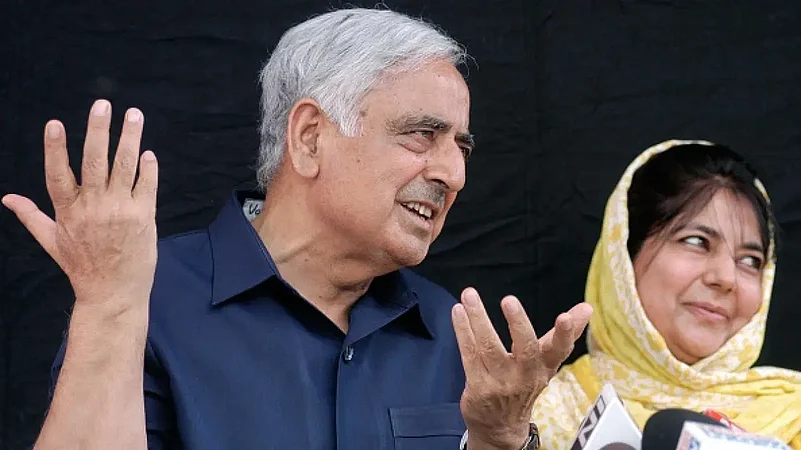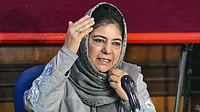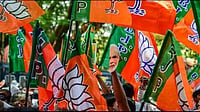Earlier this month, Jammu and Kashmir Apni Party (JKAP) president Altaf Bukhari accused “dynastic political parties” of exploiting the people of the region.
“We know that these families who have been at the helm for years and decades have always exploited common people to attain power,” he said, addressing a political rally at Bijbehara, a town about 50 km southeast of Srinagar.
“Once they achieved power, they kept innocent people busy with unrealistic and emotional slogans,” added Bukhari. “They used poor people as cannon fodder for their personal and political gains.”
Bukhari’s attack on dynastic politics is now a common theme in Jammu and Kashmir’s political discourse.
Newer parties such as the JKAP, founded in 2020, and older ones like the Jammu and Kashmir People’s Conference (JKPC) routinely accuse the Jammu and Kashmir National Conference (JKNC) and the Jammu and Kashmir Peoples Democratic Party (JKPDP) of promoting the interests of the Abdullahs and the Muftis, respectively.
The Bharatiya Janata Party (BJP) has joined the debate, claiming that it entered the political arena in the union territory to throw dynastic leaders and parties out of power. This is similar to the rhetoric it has used with some success against political families like the Gandhis at the Centre, the Yadavs in Uttar Pradesh, the Thackerays in Maharashtra, and Lalu Prasad’s family in Bihar.
The Abdullahs and the Muftis
Members of the Abdullah and the Mufti families have served as chief ministers of the erstwhile state of Jammu and Kashmir multiple times over the last 50 years.
Even before that, soon after Independence and Kashmir’s accession to India, Sheikh Abdullah, one of the founders of the Kashmir Muslim Conference which later became the JKNC, was appointed the first prime minister of the state in 1948. He served two terms before being replaced by Bakshi Ghulam Mohammad in 1953.
Despite being incarcerated for several years and exiled from Kashmir in 1971-72, Sheikh Abdullah, often called Sher-i-Kashmir or the Lion of Kashmir, continued to be the most influential politician in the state. In 1975, he returned as the chief minister (CM) of Jammu and Kashmir — a post he would hold till his death in 1982.
His son Farooq Abdullah, the current president of the JKNC, and grandson Omar Abdullah have also served several terms as CMs of Jammu and Kashmir and ministers at the Centre.
JKPDP founder Mufti Mohammad Sayeed also served several terms as Jammu and Kashmir’s CM as well as the Union home minister in the late-1980s. His daughter Mehbooba Mufti served as the last CM of the state till June 2018, when her coalition partner, the BJP, withdrew support from her government.
Dynasties or not?
In South Asia, political families — the Gandhis in India, the Bhuttos in Pakistan, the Sheikh-Wazed in Bangladesh, or the Rajapaksas in Sri Lanka — have used similar strategies to hold on to power. The first generation sets up the political party, and passes on the mantle to their descendants.
Critics accuse Sheikh Abdullah of doing something similar by choosing his son Farooq as his political heir when there were senior party leaders like Mirza Mohammad Afzal Beg.
The parties — the JKNC and the JKPDP — strongly refute accusations of dynastic politics.
Leaders of the JKNC claim that from 1953 to 1975, no one from the Abdullah family was in power. Sheikh Abdullah and many of his colleagues were in jail, accused of plotting Kashmir’s secession from India.
“It doesn’t matter whether there is a dynast or not, as long as they are winning elections for the party,” said JKNC chief spokesperson Tanvir Sadiq. “People have voted for both Farooq Abdullah and Omar Abdullah.”
JKPDP leaders claim that when Mufti founded the party in 1999 and brought his relatives into politics, elections were a fraught affair in Kashmir.
Since the early 1990s, the state had been roiled by a violent separatist movement, backed by Pakistan. Separatist leaders often called for boycotts of elections and intimidated voters. Assassination and kidnapping of politicians and workers were also common. In fact, Mufti’s daughter Rubaiya Sayeed was kidnapped by separatist militants in 1989. She was released only after the state government released jailed militants.
“No one wanted to contest elections,” said JKPDP leader Syed Naeem Akhtar Andrabi. “He (Mufti) compelled his family members — including his wife Gulshan Ara, who was a homemaker — to take part in elections.”
Another party leader, who did not want to be named, said the classical political dynasty model did not work for the JKPDP.
“Mehbooba Mufti, along with her father, established JKPDP in 1999, when everyone had written off Mufti Mohammed Sayeed,” he added.
“Mehbooba worked very hard, just like an ordinary party worker. She went to every nook and corner of Jammu and Kashmir to establish the PDP. Nothing was given to her on a platter. She made her mark by winning the love of the people.”
Heating up
Jammu and Kashmir People’s Conference (JKPC) chairman Sajjad Lone has also claimed that he is opposed to dynastic politics. However, this infuriated Farooq Abdullah, who pointed out that Lone’s father Abdul Gani Lone had been an active player in Kashmiri politics for decades.
Leaders of JKPC, however, have refuted this.
“Abdul Gani Lone sahib did not groom Sajjad sahib,” said the party’s spokesperson Adnan Ashraf Lone. “When Lone sahib was assassinated, Sajjad sahib left everything and joined the party.”
The senior Lone had been a Congress member at the beginning of his career, before forming the JKPC in 1978. He was assassinated in 2002, by suspected Pakistani operatives.
“This was not a bed of roses, there was no coronation,” said Adnan Ashraf. “There was a father’s bullet-ridden body and a struggle to sustain his ideology. Since then, it has been a story of struggle, failure, and rare triumphs.”
In the 2014 Jammu and Kashmir Assembly elections, JKPC won only two seats.
The JKPDP had secured 28 seats, becoming the largest political party in the House. It had formed the government, with the support of the BJP, which had secured 25 seats.
Mufti Mohammad Syed was the CM till his death in 2016. He was succeeded by Mehbooba Mufti, who became the first woman CM of the state. The BJP’s Nirmal Kumar Singh became the deputy CM.
However, by 2018, the ruling parties had drifted apart. After the BJP withdrew support, Mehbooba Mufti tried to form the government — unsuccessfully — with the support of the JKNC and Congress.
There have been no Assembly elections in Jammu and Kashmir since 2019 when the Union government decided to abrogate Article 370 of the Indian Constitution which gave it a special status. The erstwhile state was also reorganized into the union territories of Jammu and Kashmir and Ladakh.
With another former CM of the state, Ghulam Nabi Azad, resigning from the Congress last week and announcing that he would form his own party, the debate over dynastic politics in the union territory is likely to heat up.
Elections to the state Assembly could be held later this year, with the final delimitation report coming into effect in May. According to the report, the Assembly will now have 90 seats — 43 in Jammu and 47 in Kashmir.


























